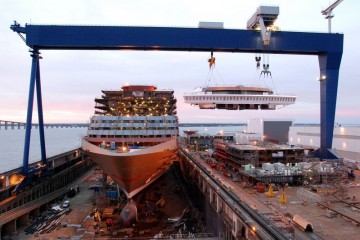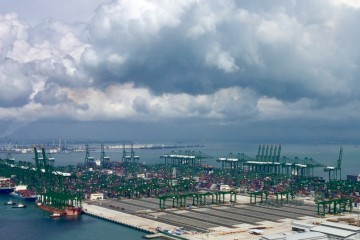What will the future of global trade look like and what does that mean for shipping and ports? When thinking of the future, we often suffer from a technology bias. We think that cars will fly, that ships will be autonomous and that big data will change everything. The future of global trade could indeed be shaped by technological change and shifting global economic patterns, but might even more forcefully be determined by something highly etheric: our values.
The idea of global trade is not very popular these days; much less appealing than Trump and Bernie, it seems. Global trade stands for outsourcing and job losses; global trade needs a wall. Yet, the intellectual demise of globalisation is not only the work of the disenchanted, but also of those without disappointment: the urban hipsters, the idealists, the millennials; an emerging amount of which in emerging economies. It is this coalition of unlikely bedfellows that might bring down global trade.
The disenchanted wants work, the hipster quality of life. He might live in a former port warehouse, he does not want its pollution. He is opposed to the port as node of globalisation, unless it becomes much cleaner or simply goes away: ports are occupying prime waterfront space anyway.
The idealist wants cleaner energy, more local food and a fairer and greener transport chain. Cleaner energy, so: less fossil fuels, less coal plants, more renewables. More local food, so less food from elsewhere. And of course a fairer and greener transport chain: the sea is not a waste bin, nor a place for modern slavery. After the fair trade certifications of products, time to integrate fair and green transport in it.
Shifting values are also driven by demographic change. There is a generation that will never own a car, because there is no need. Shared cars emerge everywhere; owning a car will soon be very has-been.
So what does this suggest? We might be heading for a future with less maritime trade in coal, oil, cars, food and possibly consumer goods; a future in which sustaining port activity is not self-evident and maritime transport likely more expensive.
For ports this means three things.
- Communicate. Explain what a port is; why it is important and listen, so that you can propose solutions. Missing this opportunity might mean the end of your port.
- Prepare for other cargo. This could be biomass; it could be blades of wind turbines. Nobody knows exactly, so it is foremost an exercise in flexibility and grasping opportunities when they appear.
- Prepare for other functions. Port are often also industrial areas. Refineries and coal plants might become redundant, so there is room for something new.
4 Comments
Comments are closed.




Agree with everything, especially with communication in the first place. Ports must recognize the importance of their different groups of stakeholders, and their impacts on each one of these groups (particularly on citizens). And I think that reporting is a good way to do it, get closer and gain confidence.
An unusual and insightful view of the future. The economic power of these groups is disproportionate to their numbers. They have lived through the loss of many of their parents generation jobs through outsourcing and seen the aftermath. It’s not unusual to hear them talking about not buying from company A or B because they moved their service centre to .. name the country …Traditional shopping centres are losing steam as online ordering increases and the shopping experience worsens, but most importantly as local buying increases too. Local buying to them implies lower carbon footprints although the data is not always in agreement. I totally agree that to look towards technology alone in forecasting the future industry is missing a huge piece of the puzzle. Ports must be aware of and build strategies to engage with the various stakeholders who currently use them and might not in the future.
Interesting post indeed. However, it’s primarily a first world problem, as the development of third-world Hipsters is far off, as it requires not only significantly different values, but also the financial freedom to actually live that way. But for the first world: yep.
On the other hand, the sheer volume of trade for the developing economies means that international trade is hardly going to disappear even over the next generation. Doesn’t mean that your points about maintaining flexibility and the importance of looking forward don’t matter: they do.
Great post..